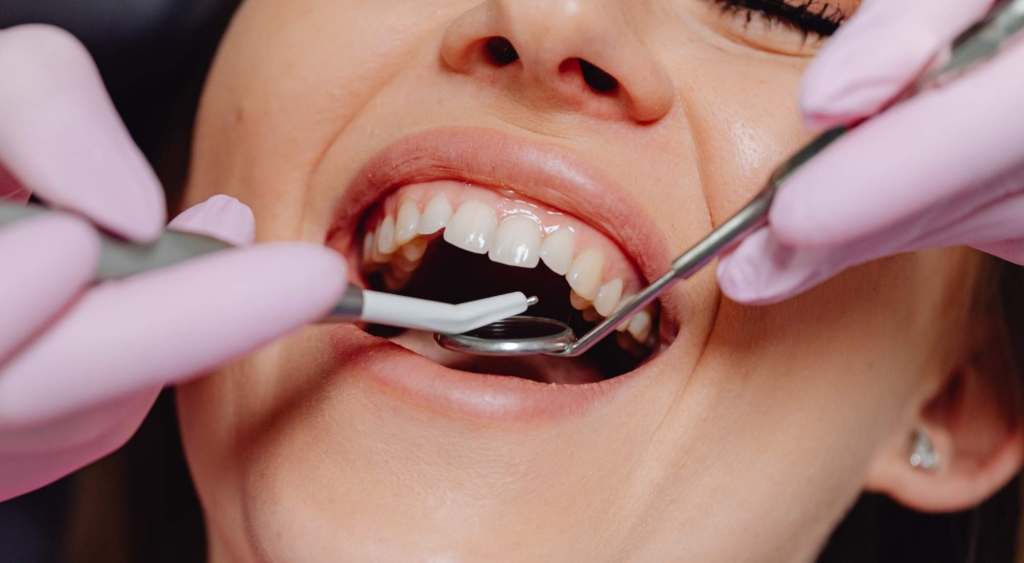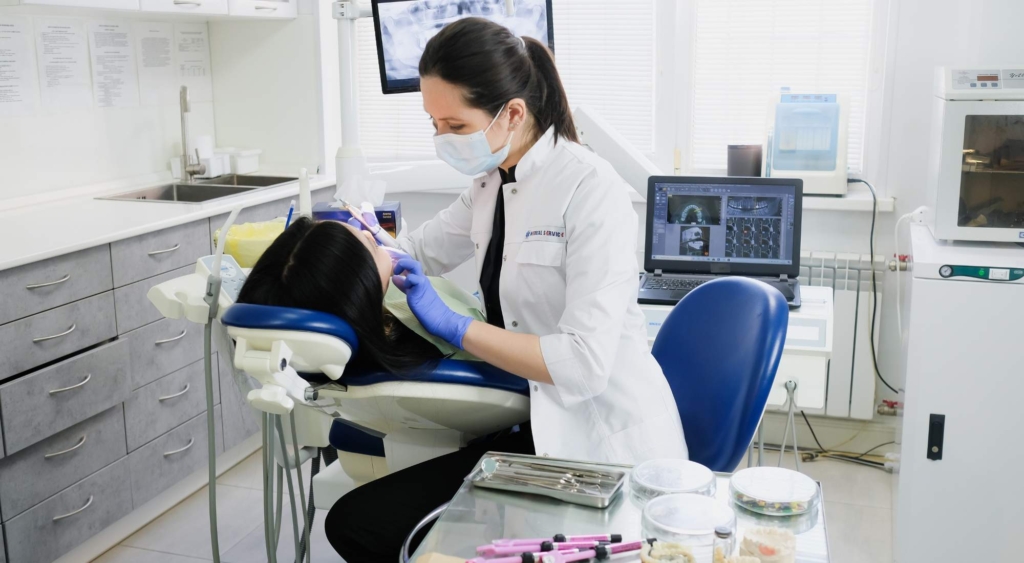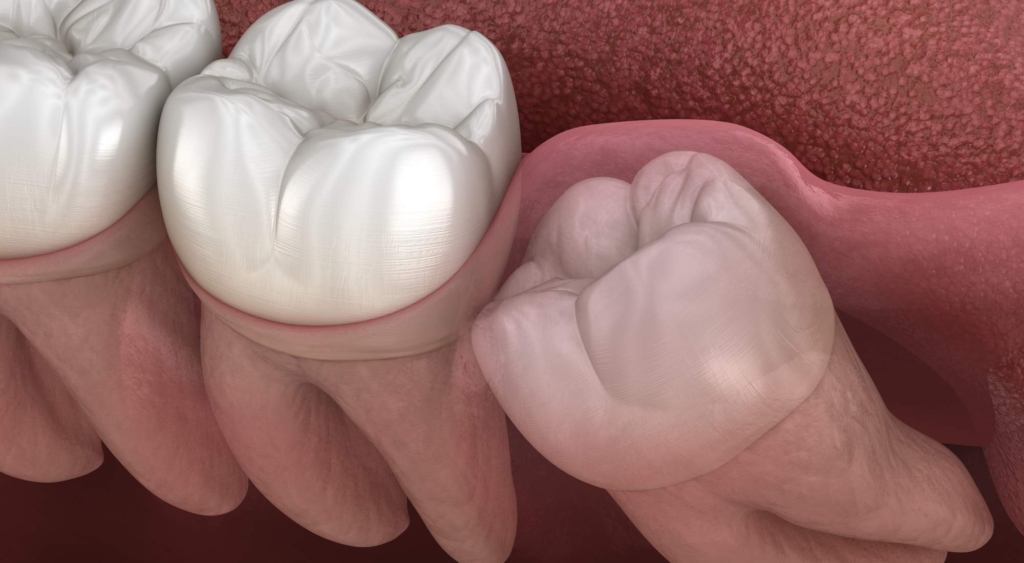Expert Information Regarding the Purpose, Care, and Removal of Wisdom Teeth
You’ve been to the dentist before, so you know the drill — you expect a cleaning and maybe some diagnosing of a cavity or something benign.
But this time, it’s different. You get an x-ray, and your dentist tells you that your wisdom teeth are coming in.
Maybe this is your first wisdom tooth/teeth, or maybe you’ve already had some removed; either way, the arrival of your wisdom teeth is news to you.
So let’s talk about wisdom teeth.
Keep reading to find out the tooth (truth) about what wisdom teeth are, if everyone has them, and what it means to keep or remove your third molars.
Table of Contents
- What Are Wisdom Teeth?
- Does Everyone Have Wisdom Teeth?
- Does Everyone Have To Get Their Wisdom Teeth Removed?
- How To Properly Care for Your Wisdom Teeth
- What Are Some Complications Caused By Wisdom Teeth?
- When Is it Time To See a Dentist for Your Wisdom Teeth?
- Mint Dental Works: Providing Wisdom Teeth Care in Portland, OR, Since 2003

What Are Wisdom Teeth?
Wisdom teeth, also known as third molars, are the last set of adult teeth to grow in.
These molars are referred to as “wisdom teeth” because they do not emerge until later in a person’s life compared to other permanent dentitions (your set of adult teeth). They are located in the back row of your jaw and often do not have the room to emerge properly — hence, the need for removal.
What Is the Purpose of Wisdom Teeth?
Wisdom teeth are like most of your other molars. Their purpose is to grind food to aid the digestion process. Molars are designed to sustain great biting force and are especially useful when chewing tough cuts of meat or hard legumes.
We no longer require the use of our wisdom teeth. Evolution has rendered them mostly defunct, but some people still develop their wisdom teeth.
When Do Wisdom Teeth Come In?
Tooth eruption is the process of our “teeth coming in”. The average age for wisdom tooth eruption is around 17-21 years of age. But it is not uncommon for some people to have their wisdom teeth erupt outside of that age range.
Does Everyone Have Wisdom Teeth?
Contrary to popular belief, not everyone has wisdom teeth, and some people even have more or less than four. Let’s explore why some people do not have wisdom teeth and some do.
While it is not rare to have four wisdom teeth, it is relatively rare to have more than four. These extra teeth are called supernumerary teeth. Less than 5% of the population has more than four wisdom teeth.
Why Do Some People Not Have Wisdom Teeth?
Genetics, evolution, and modern diet are likely answers to why some people do not have wisdom teeth.
Scientists classify wisdom teeth as vestigial organs. Like the appendix, our modern evolution has outpaced our need for our wisdom teeth. In response to this, some genetic lines have limited or nonexistent wisdom teeth due to genetics.
Genetics
Research has found that roughly 35% of the world’s population is born without wisdom teeth. This is referred to as “wisdom tooth agenesis” or “M3 agenesis”.
The exact genetic reason for M3 agenesis is idiopathic (unknown). Some wisdom tooth agenesis is caused by certain syndromes like hypodontia or oligodontia, which are both congenital disorders that result in the absence of permanent or primary dentition.

Evolutionary Changes
New studies suggest that early humans may have “traded bite for brain”.
A genetic mutation was discovered while studying bite forces in primates that may have been the cause of human brain and skull enlargement.
This genetic mutation resulted in weakened jaw muscles that allowed the brain to grow larger and the jaw bone to become more narrow as humans evolved.
When early humans developed narrower jaws, the human jaw became too small to properly house wisdom teeth without the risk of complications.
Dietary Changes
In the ancient world, our wisdom teeth served the same purpose as the rest of our teeth: grinding food for digestion. A primitive diet consisted of a lot of raw meats, vegetables, and nuts, which could be hard on the digestive system.
Early humans also prepared food differently and may have needed the extra teeth to ensure that uncooked food was chewed properly enough to aid digestion.
Modernity has revolutionized our food preparation, so our food is softer than our ancestral counterparts. And with the advancement of utensils like knives and forks, we no longer rely on our teeth to crush raw, uncooked food.
Does Everyone Have To Get Their Wisdom Teeth Removed?
Not everyone has to get their wisdom teeth removed. Wisdom teeth removal is common and encouraged but not always required.
Whether or not your wisdom teeth need to be removed is dependent on a variety of factors:
- Your mouth/jaw shape and size
- The position of your teeth
- How your wisdom teeth erupt
- If your erupting wisdom teeth will cause a shift in your bite
- Risk of complications like impaction or infection
The choice is up to you and what your dental provider advises.
The care of your teeth is essential to your overall systemic health. It’s important to choose a provider that can expertly address your needs.
Mint Dental Works has the technology and clinical knowledge to get to the root of your wisdom tooth concerns, care, and treatments. We have been providing Portland dental care that prioritizes choice, efficient practices, and improved comfort since 2003. Contact us today to schedule an appointment.
Can Wisdom Teeth Grow Back?
Wisdom teeth cannot grow back.
Some people have four or fewer wisdom teeth, and sometimes people have four or more. Since wisdom teeth can erupt later in life, some individuals who have more than four wisdom teeth may have the first four removed — only for the last one or two to erupt years later.
Sometimes regular dental X-rays, like periapical (often only showing one area of teeth from root to tip) or bitewing (most common dental X-ray showing full sets of teeth in one shot) may be insufficient for viewing wisdom teeth that are in the pre-eruption stage. This may be how some individuals’ “bonus” wisdom teeth are overlooked.
How To Properly Care for Your Wisdom Teeth
Your teeth are precious because once you get your permanent dentition, you only get that set. Leaving your wisdom teeth in may cause complications like impaction or infection, as well as crowding that could make it hard to properly clean your teeth.
If you choose to leave your wisdom teeth, be sure to routinely visit your dentist for cleaning and detection of wisdom tooth infection. You may also want to:
- Make sure you brush your teeth two to three times a day. Be patient and thorough. Be sure to reach every surface, especially hard-to-reach areas. Wisdom teeth may be more prone to cavities since they sit so far back in the mouth. You may ask your dentist what tooth cleaning products would work best for your teeth.
- Be sure to floss at least once a day. You may ask your dentist what flossing product would work best for you.
- Use antibacterial mouthwash, preferably alcohol-free. Mouthwash with alcohol may dry out your mouth and contribute to bad breath and germ production.
What Are Some Complications Caused by Wisdom Teeth?
Inflammation and Pain
A common symptom of wisdom tooth eruption is inflammation and pain. This is often caused by the tooth pressing against the nerves in your mouth. This pain may come intermittently and vary from moderate to severe levels.
Swelling, redness, and pain due to wisdom teeth may also be a sign of other complications. Be sure to have your dentist inspect your wisdom teeth if you suspect that they may be erupting.
Impacted Tooth
Wisdom tooth impaction is caused by a lack of room for normal eruption. Impacted wisdom teeth often migrate into the space of other teeth, often causing pain, pathological tooth migration, and damage to other teeth.
Symptoms of wisdom tooth impaction might include:
- Bad breath
- Pain or tenderness
- Prolonged headache or jaw ache
- Swollen lymph nodes
- Unpleasant taste when biting on or near the affected area
- Difficulty opening the mouth
Wisdom tooth impaction is extremely common. According to the American Academy of Oral and Maxofillial Surgeons, nine out of ten Americans may have at least one impacted wisdom tooth.
There are four types of wisdom tooth impaction positions which include:
- Mesial impaction: This is the most common form of impaction. The wisdom tooth is angled towards the front of the mouth.
- Distal impaction: This is the rarest form of impaction. The tooth is angled towards the back of the mouth.
- Vertical impaction: This type of impaction occurs when the tooth is in the correct position for eruption, but it is trapped beneath the gums.
- Horizontal impaction: This form of impaction happens when the wisdom tooth is completely on its side and trapped underneath the gums.

Oral Infections
Wisdom teeth may cause infection after erupting because there is not enough space between the teeth to achieve good oral hygiene. Other times an oral infection may be caused when the wisdom tooth, itself, becomes infected.
Pericoronitis is the term for an infected wisdom tooth.
According to a 2016 review, pericoronitis may affect 81% of individuals aged 20-29 years. Bacteria and plaque may often accumulate around early erupting wisdom teeth, making them further susceptible to infection.
Impaction may also contribute to oral infections, cysts, gum disease, tooth decay, and cavities.
Shifting of Teeth
Often when wisdom teeth do not have enough room, they will shift other teeth as they erupt and settle.
Shifting may cause teeth to become misaligned or crooked. This can be an issue for those who have had orthodontic work like braces or individuals who were blessed with a naturally straight smile.
Overcrowded teeth may also inhibit the efficacy of your oral hygiene practices. It may often be more difficult to reach surfaces of teeth that have been pushed into other teeth at awkward angles.
When Is It Time To See a Dentist for Your Wisdom Teeth?
You may want to have your dentist inspect your wisdom teeth before they erupt, around age 15 or 16, to get an idea of their development.
Wisdom teeth may cause complications, shifting teeth, discomfort, and inflammation. A dentist may need to verify that your wisdom teeth will not cause any future issues or impair your ability to practice routine dental hygiene.
If you have lasting or worsening pain, symptoms of impaction or infection, or even notice your teeth are moving, you may want to speak with a dentist.
Whether you remove them before or after complications arise, you’ll want a reliable dentist to help you maintain your dental health — with or without your wisdom teeth.
Mint Dental Works provides a multitude of services. Our practice includes general, specialty, and cosmetic treatments and services.
Mint Dental Works: Providing Wisdom Teeth Care in Portland, OR, Since 2003
Don’t let your wisdom teeth go unchecked, If you’re in the Portland area, visit Mint Dental Works!
For nearly 20 years we have been helping our patients achieve excellent dental health and reach their smile goals. We love our city and the beautiful environment of Oregon, which is why we employ an environment-friendly approach to dentistry.
After all, Mint is the new green.
Our innovative technology is sustainable and high-tech, ensuring our patients that the hands they leave their teeth in have all the right tools. Contact us today for a full evaluation of your pre or post-erupted wisdom teeth.
The content in this blog is not intended to be a substitute for professional medical advice, diagnosis, or treatment. Always seek the advice of your physician or other qualified health provider with any questions you may have regarding a medical condition.

